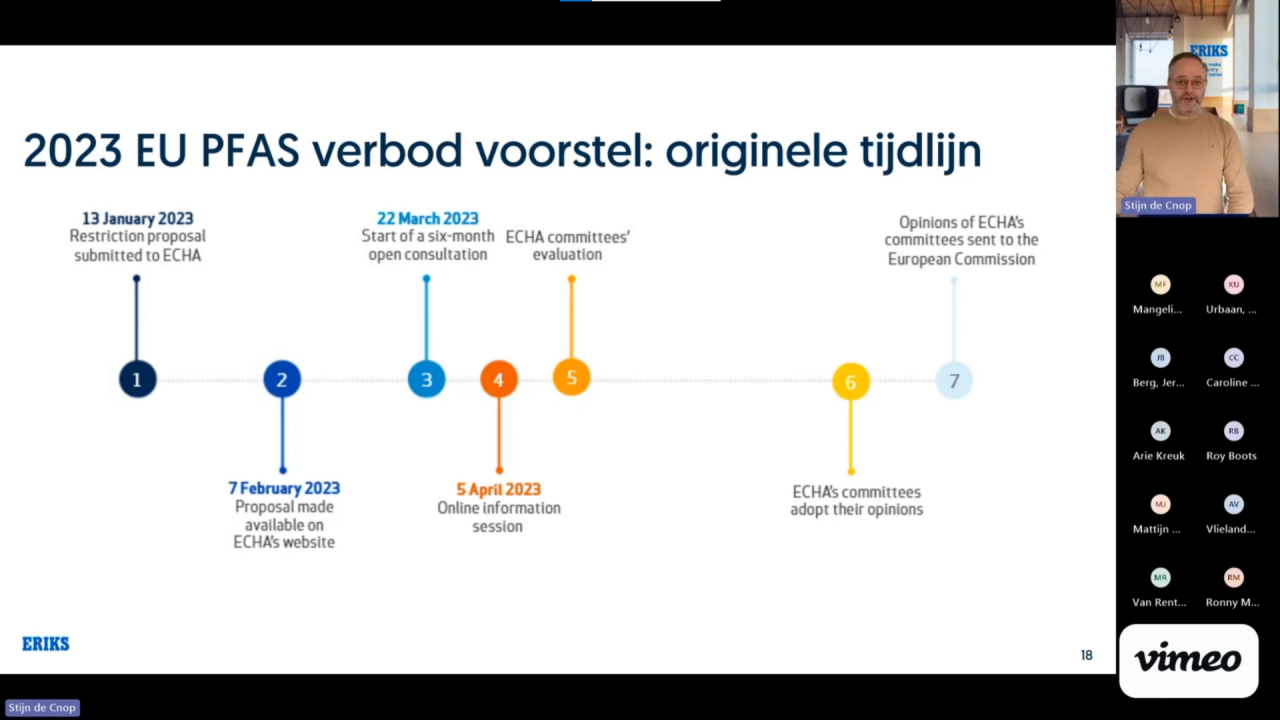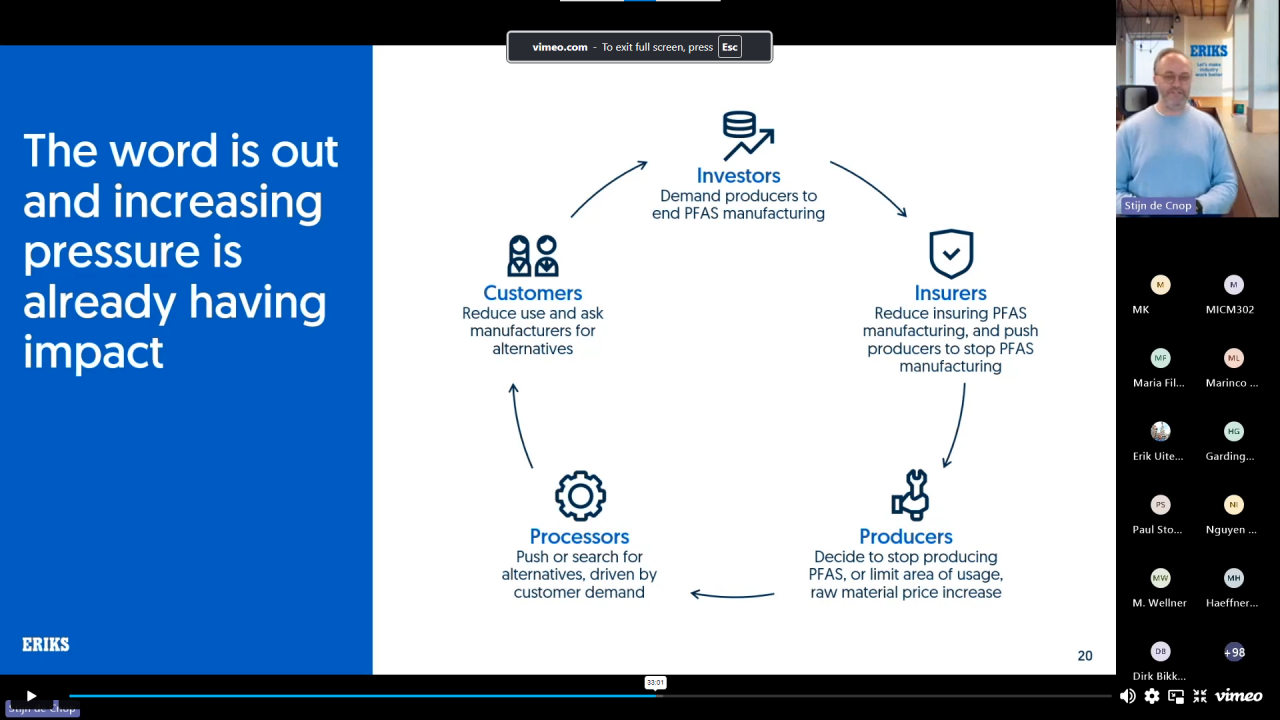In this article
How the PFAS ban proposal could impact industries and applications

Key developments on PFAS ban proposal — Update December 2025
Updated PFAS ban proposal
The five countries who submitted the initial PFAS ban proposal in 2023, have updated and often loosened their proposal. The updated proposal is relevant to our industrial customers and products which ERIKS supplies.
- For Sealing Applications in industrial uses (this also include sealings in for example valves) and Lubricants in industrial uses, the proposal from the dossier submitters is ‘’A ban with a transition period of 18 months and a 12-year derogation’’.
- Hoses and plastic parts are not addressed as category; their use is likely part of the industry/sector evaluations by European Chemicals Agency (ECHA).
We emphasize that this is only the proposal of the dossier submitters. This is not a conclusion by European Chemicals Agency (ECHA), neither the approval by the European Parlement, who are eventually the approvers of a new law.
The full updated proposal and Annexes can be found on ECHA’s website: Per- and polyfluoroalkyl substances (PFAS) - ECHA
Next steps and timing
The European Chemicals Agency (ECHA) continues with industry/sector evaluations, including risk assessments and socio-economic analysis.
- There will be a new public consultation round in Q1-Q2 2026.
- ECHA final opinions are expected end of 2026, and ECHA will then officially submit their opinion to the European Commission.
- After that, the process starts to create and implement a new European law. This process will likely take 1-2 years.
All latest and previous ECHA updates about the PFAS ban proposal can be found on: Per- and polyfluoroalkyl substances (PFAS) - ECHA
The proposed EU-wide PFAS ban, presented by the European Chemical Agency (ECHA) on February 7th, 2023 has prompted many discussions. We wanted to give you some background information on this proposal. Some ERIKS customers have been asking questions such as, ‘’can we oppose this ban proposal?’’, ‘’are PFAS-free alternatives available? ’or ‘’what will happen if the ban proposal will be put in place?"
Here at ERIKS, we understand that the PFAS topic raises many questions and concerns. That's why we've put together this FAQ to explore the topic and give you some answers.
If you have any further questions or concerns about the proposed restriction, don't hesitate to reach out to us. We're here to help you navigate these changes.
Frequently Asked Questions
What is the scope of the EU ban proposal on PFAS?
The EU ban proposal contains a list of around 10,000 man-made per- and polyfluoroalkyl substances, abbreviated as PFAS. ECHA, the European Chemical Agency, defines PFAS as any substance that contains at least one fully fluorinated methyl (-CF3) or methylene (-CF2) carbon atom (without any H/Cl/Br/I attached to it)
The proposed restriction is a joint effort by Germany, the Netherlands, Denmark, Norway, and Sweden and might become the most significant chemical restriction in the EU's history. It is referred to as a ‘universal restriction’ proposal due to its broad scope, aiming to ban the manufacture, placing on the market, and the use of PFAS as such, but also PFAS contained as constituents in other substances, mixtures, and products
Which products and materials contain PFAS?
PFAS substances are used worldwide in a variety of products and materials due to their outstanding chemical, thermal and low-friction properties. They can be found in many consumer goods among others, in textiles, fire extinguishers, cooking equipment, toothpaste, as well as in industrial, or non-consumer applications.
At ERIKS, PFAS substances are related to ERIKS products predominantly found in products composed of, or containting, materials like PTFE, FKM, FFKM, PVDF, FEPM, FEP, and PFA. These can be found in certain seals, hoses, valves, gaskets, plastic parts, power transmission, lubricants, PPE, etc. At this moment, it remains is still too soon to draw exact regulatory conclusions regarding the future of these products and materials. Important to know is that all the products ERIKS supplies in the European Union comply with PFAS regulations as prescribed by the EU REACH and EU POP regulations.
Are PFAS-free alternatives readily available?
Currently, there are no 1-on-1 PFAS-free alternatives available, with the same properties as PFAS containing products.
PFAS-free materials exist, of course, but:
- they have other properties and therefore might not work or have a shorter lifetime
- for certain products (e.g., valve seats, hoses) they are not (easily) available
It is expected that the market for PFAS-free materials with exceptional properties will grow, but that’s a process of years. At ERIKS, we are actively exploring PFAS-free solutions with outstanding properties.
What's the status of the proposal as of March 2024, and when will the proposed ban take effect?
The public consultation round, which ended in September 2023, resulted in a large reaction from end-users and manufacturers. More than 5,600 socio-economical impact assessment where sent to ECHA. It will take a serious amount of time to evaluate all these studies.
The latest updates by ECHA do not provide detailed information.
There is a lot of speculation at the moment, from both environmental groups and manufacturers. It is currently not possible to say which PFAS, for which products or industries, will be banned in the short term, in the long term or which exemptions will be put into place. The proposal gives an indication, but it's not said that the submission will be adopted in the proposed way.
For latest information on the ECHA timeline and next steps, please view ECHA’s website.
What is ERIKS doing to prepare for a potential ban?
At ERIKS, we are actively involved in the ongoing PFAS debate in different industry groups, but first steps in new material developments will predominantly come from the big chemical companies who produces monomers and polymers.
For a few products and applications, we have started to work on developing alternatives. This process requires involvement of the entire supply chain, from chemical producers, who manufacture the new raw materials, to processors, developers and end-users to validate and approve new options. These developments often take years.
If a full ban will be implemented by ECHA according to the initial proposal, then this will have a large impact for all users of materials that contain PFAS.
3M announced it will stop production of PFAS-containing chemicals in 2025. Will I still be able to buy my products?
3M announced to stop producing and using all PFAS in their portfolio by the end of 2025. ERIKS investigated the impact, and changed to other raw material suppliers, and in some cases also working with customers to revalidate.
The future of PFAS and its alternatives is still uncertain, but ERIKS is proactively working to address potential challenges and find solutions for our customers. Together with our manufacturers, we must use this as an opportunity for innovation and the development of new, more sustainable, products and materials.
What is happening outside EU regarding PFAS?
The PFAS topic is also outside EU very active, especially in USA. On Federal level, USA implemented a PFAS reporting obligation for companies withinin USA, which is regulated under Toxic Substances Control Act (TSCA) section 8(a)(7)
On top of that many states have additional specific PFAS regulations, of which the state of Maine the most stringent. They have an almost full PFAS ban which will be in effect as of 2032.
It’s important to know that the PFAS definition in USA (defined by the American EPA) is slightly different than the European one, but there is large overlap, especially on fluorpolymers.
Responsible chemical management
As part of our commitment to sustainability, ERIKS increases its focus on responsible chemicals management, for example with PFAS. Our product specialists undergo training to stay informed about PFAS in ERIKS portfolio and the relevant legislations, and to which extent alternatives are possible. We are actively engaging with our customers and suppliers to explore alternative non-PFAS products, allowing us to guide customers who seek to minimise their use of PFAS products. Through these concerted efforts, we uphold our environmental responsibilities and empower our customers to make informed choices for a safer, more sustainable future.
Authors:
Harrie Vangangelt, Quality and Compliance Manager, Sealing & Polymer Europe
Stijn De Cnop, Global Product Compliance Manager
PFAS Webinar Recordings
Subscribe to our newsletter:
For the latest industry news and updates.


